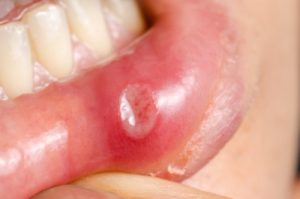Questions to Ask Your Dentist About Canker Sores

Brushing and flossing daily are great ways to keep your mouth clean and healthy. Unfortunately, consistent dental care isn’t always enough to keep our mouths happy. A common condition that patients ask dentists near St. Charles about is canker sores. Approximately 20 percent of Americans suffer from recurring canker sores, which can be uncomfortable and unsightly.
What Is a Canker Sore?
Also called aphthous ulcers, canker sores are small sores that occur inside of the mouth. They typically form on the tongue, the inner cheeks, the roof of the mouth, and the gums. They are usually yellow or white in color and bordered by redness. Unlike cold sores, which are highly contagious, canker sores can’t be spread to other people. Also, cold sores usually form on the outside of the mouth, while canker sores are usually inside of the mouth.
What Causes Canker Sores?
Like many conditions, some people are more genetically prone to developing canker sores. Trauma to parts of your mouth from, for instance, chewing on a sharp-edged food or biting your cheek, can leave the tissue prone to developing a canker sore. Food allergies, stress, fatigue, and nutritional deficiencies also appear to have a role in the manifestation canker sores. Your dentist may recommend making a note of when you develop canker sores to try to determine if there is a link between your canker sore outbreaks and your diet or lifestyle.
What Treats Canker Sores?
If you already have a canker sore, you will find that avoiding particular foods, such as anything acidic or spicy, will reduce the painfulness of the sore by not aggravating the sensitive area. Over-the-counter medications such as pain relievers, topical anesthetics, and mouth rinses can sometimes ease your discomfort until the sore heals. Canker sores usually don’t last much longer than a week. If you have a sore in your mouth that persists for two weeks or more, it is recommended that you contact your dentist.
